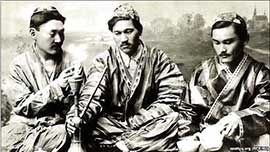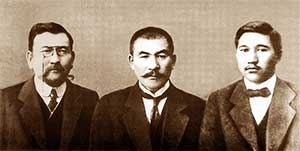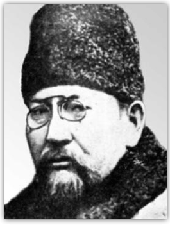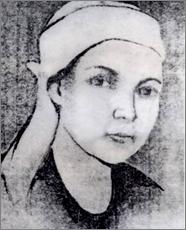
|
Date: |
|
|
|
Theme |
“Akhmet Baitursynov is the leader of the spiritual heritage of Kazakh people” |
|
|
Type of the lesson |
Round table |
|
|
The aim |
- to enrich students’ knowledge about Akhmet Baitursynov; - to develop students’ critical thinking - to educate the respect and interests in Akhmet Baitursynov ’s works |
|
|
Expected result |
-get more information about Akhmet Baitursynov -enrich knowledge about Akhmet Baitursynov |
|
|
Recourses used |
Internet, Selected poems of Akhmet Baitursynov |
|
|
Visual aids of the lesson |
Slaid show, cluster, pictures, music, poster |
|
|
Procedure of the lesson |
Teacher’s activity Greeting of the participants of the round table |
Student’s activity Good morning |
|
Introduction |
Today we dedicate our round table to Akhmet Baitursynov. During the political events of the early twentieth century, during the years of two revolutions that shook the country, there were Alash leaders who knew the nation well, accurately determining the direction of their people. One of them is the great figure of the Kazakh people Akhmet Baitursynuly, a poet, scientist, turkologist, translator, teacher, publicist, public figure who fought for the independence of his nation. Akhmet Baitursynuly was one of the brightest leaders of the Kazakh national intelligentsia. His personal merit is the formation of his own platform for national independence. In his literary work and journalism, he first justified the scientific and philosophical, social content of the concepts of "freedom" and" equality", created an original concept of the free development of Kazakh society. The red thread in the work of Akhmet Baitursynov is the liberation idea of the Kazakh people. |
|
|
Main part
|
First of all please your attention to video. Akhmet Baitursynov was born in January 1873 in Sarytubek, where the river Zhilanchik flows into the lake Akkol (present-day territory of Zhankeldin area of Kostanai oblast). After the successful graduation of a two-year school in Torgai in 1891 Akhmet entered the specialized school in Orenburg which trained teachers for Kazakh schools and in 1895 his pedagogical profession in aul and volost schools of Aktobe, Karkaraly and Kostanai began.
These years was the time when Akhmet Baitursynov was drawn to literary activity, he translated Krylov’s fables into the Kazakh language. Simultaneously he was busy creating the first in time textbooks in the Kazakh language, started national schools, wrote such books as “Masa” (“A Fly”), “Kyryk mysal” (“Forty fables”).
Akhmet Baitursynov stood at the beginnings of literary criticism and Kazakh linguistics. In the twenties on basis of Arabic script and taking into considerations peculiarities of the Kazakh language he created the Kazakh alphabet, wrote some books concerning the problems of Grammar, Morphology, Phonetics, Methodology and contributed much to advancement of the Kazakh literature and culture.
Many years of Akhmet Baitursynov’s life and activity are connected with the creation of Alash-Orda and foundation of Alash party; he was one of the authors of the party programme. This programme stated that Russia should be a democratic-federative republic and Kazakhs should be granted autonomy. It is significant that the Provisional people’s council of Alash-Orda was composed of 25 members, out of which 10 were representatives of Russians and other ethnics living in Kazakhstan.
The twenties were a difficult period in the history of Kazakhstan; the intelligentsia was persecuted by henchmen of Stalin’s regime. In 1929 A. Baitursynov was arrested and then exiled to Arkhangelsk Oblast, his scientific and poetic heritage was banned. Only in 1934 with the assistance of E.P. Peshkova, Maxim Gorky’s wife, who worked for the Red Cross, Baitursynov was released from exile ahead of time. But in August 1937 he was imprisoned on charges of counter-revolutionary activity. He didn’t plead himself guilty, as the Chairman of Kazinpros he only expressed his disagreement with some actions of the Soviet government. The exile deeply undermined Akhmet’s health. In accordance with the resolution of the Almaty oblast NKVD (PCIA) (The People’s Commissariat for Internal Affairs) troika (group of three) on the 25 of November 1937 he was sentenced to be shot. His life as the lives of many representatives of intelligentsia was terminated in 1937. The resolution was executed on the 8 of December 1937.
Akhmet Baitursynov’s permanent life companion was his beloved wife. She was born in 1878 in Chelyabinsk oblast. Being a teacher at a Russian-Kazakh school in Aulekol (100 kilometers from Kostanai) she got acquainted with Akhmet Baitursynov. In that same 1896 they married in the mosque of Troitzk. Since that time Aleksandra Ivanovna began to practice Islam. With her consent her husband named her Badrisafa Mukhamedsadykkyzy. Their family life started in Kostanai. In connection with the exile of A.Baitursynov in 1929 to Arkhangelsk Badrisafa as the public enemy’s wife together with their daughter Sholpan was exiled in 1391 to Tomsk oblast. Then they were separated; Sholpan was left in Tomsk and Badrisafa was sent to Western Siberia for tree felling in the village of Zhukovo.
In 1934 they came back to the motherland. In 1937 when A.Baitursynov was arrested and shot Badrisafa was arrested again and exiled to Sverdlov Oblast. There she fell seriously ill. On her returned to Kostanai the helpless Badrisafa was taken to the hospital for the disabled people. She became the victim of Stalinist repressions; her life tragically ended on the territory of Kostanai oblast. In memory of people up to now legends about this pure beautiful love of Akhmet and Badrisafa who managed to retain it through their hard lives full of hardships and sufferings pass from mouth to mouth. They complemented each other nicely: Akhmet - wise, intelligent, a person of fortitude and Badrisafa – gentle, feminine, equally a person with a strong mind. Their names are recollected by people coupled with, without being separated from one another. Many-sided talent of Akhmet Baitursynov permitted him to try his pen in poetry, in social and political journalism, in science and other fields of culture. He is not only a scholar, translator, ethnographer, author of many textbooks he is the author of many poems for younger children. Akhmet-aga was a great Ustaz – the Teacher with a capital T for children and grown-ups. He was and is in memory of people as a bright luminary of Kazakh science and culture
|
watch videos
6-7 students tell short information
-
students tell poems by heart
Students give answer. Some students tell some words of Abay Kunanbaev
Dance
Students dance |
|
Feed back |
Our students prepared poems of Akhmet Baitursynov in three language Kazakh, Russian and English |
Students recite poems |
|
Conclusion |
Akhmet Baitursynov said: “If for people the main wealth is health, the main wealth of soul, of heart are knowledge and arts. Only due to them peoples find their place in civilization. The main objective is to pass knowledge on to youth, to teach them to learn a trade, to obtain a profession. In order to realize these objectives it is necessary to start Kazakh schools and teach in the Kazakh language all over the Kazakh steppe. This is our main goal and objective.” |
|
жүктеу мүмкіндігіне ие боласыз
Бұл материал сайт қолданушысы жариялаған. Материалдың ішінде жазылған барлық ақпаратқа жауапкершілікті жариялаған қолданушы жауап береді. Ұстаз тілегі тек ақпаратты таратуға қолдау көрсетеді. Егер материал сіздің авторлық құқығыңызды бұзған болса немесе басқа да себептермен сайттан өшіру керек деп ойласаңыз осында жазыңыз
Round table "Akhmet Baitursynov"
Round table "Akhmet Baitursynov"
|
Date: |
|
|
|
Theme |
“Akhmet Baitursynov is the leader of the spiritual heritage of Kazakh people” |
|
|
Type of the lesson |
Round table |
|
|
The aim |
- to enrich students’ knowledge about Akhmet Baitursynov; - to develop students’ critical thinking - to educate the respect and interests in Akhmet Baitursynov ’s works |
|
|
Expected result |
-get more information about Akhmet Baitursynov -enrich knowledge about Akhmet Baitursynov |
|
|
Recourses used |
Internet, Selected poems of Akhmet Baitursynov |
|
|
Visual aids of the lesson |
Slaid show, cluster, pictures, music, poster |
|
|
Procedure of the lesson |
Teacher’s activity Greeting of the participants of the round table |
Student’s activity Good morning |
|
Introduction |
Today we dedicate our round table to Akhmet Baitursynov. During the political events of the early twentieth century, during the years of two revolutions that shook the country, there were Alash leaders who knew the nation well, accurately determining the direction of their people. One of them is the great figure of the Kazakh people Akhmet Baitursynuly, a poet, scientist, turkologist, translator, teacher, publicist, public figure who fought for the independence of his nation. Akhmet Baitursynuly was one of the brightest leaders of the Kazakh national intelligentsia. His personal merit is the formation of his own platform for national independence. In his literary work and journalism, he first justified the scientific and philosophical, social content of the concepts of "freedom" and" equality", created an original concept of the free development of Kazakh society. The red thread in the work of Akhmet Baitursynov is the liberation idea of the Kazakh people. |
|
|
Main part
|
First of all please your attention to video. Akhmet Baitursynov was born in January 1873 in Sarytubek, where the river Zhilanchik flows into the lake Akkol (present-day territory of Zhankeldin area of Kostanai oblast). After the successful graduation of a two-year school in Torgai in 1891 Akhmet entered the specialized school in Orenburg which trained teachers for Kazakh schools and in 1895 his pedagogical profession in aul and volost schools of Aktobe, Karkaraly and Kostanai began.
These years was the time when Akhmet Baitursynov was drawn to literary activity, he translated Krylov’s fables into the Kazakh language. Simultaneously he was busy creating the first in time textbooks in the Kazakh language, started national schools, wrote such books as “Masa” (“A Fly”), “Kyryk mysal” (“Forty fables”).
Akhmet Baitursynov stood at the beginnings of literary criticism and Kazakh linguistics. In the twenties on basis of Arabic script and taking into considerations peculiarities of the Kazakh language he created the Kazakh alphabet, wrote some books concerning the problems of Grammar, Morphology, Phonetics, Methodology and contributed much to advancement of the Kazakh literature and culture.
Many years of Akhmet Baitursynov’s life and activity are connected with the creation of Alash-Orda and foundation of Alash party; he was one of the authors of the party programme. This programme stated that Russia should be a democratic-federative republic and Kazakhs should be granted autonomy. It is significant that the Provisional people’s council of Alash-Orda was composed of 25 members, out of which 10 were representatives of Russians and other ethnics living in Kazakhstan.
The twenties were a difficult period in the history of Kazakhstan; the intelligentsia was persecuted by henchmen of Stalin’s regime. In 1929 A. Baitursynov was arrested and then exiled to Arkhangelsk Oblast, his scientific and poetic heritage was banned. Only in 1934 with the assistance of E.P. Peshkova, Maxim Gorky’s wife, who worked for the Red Cross, Baitursynov was released from exile ahead of time. But in August 1937 he was imprisoned on charges of counter-revolutionary activity. He didn’t plead himself guilty, as the Chairman of Kazinpros he only expressed his disagreement with some actions of the Soviet government. The exile deeply undermined Akhmet’s health. In accordance with the resolution of the Almaty oblast NKVD (PCIA) (The People’s Commissariat for Internal Affairs) troika (group of three) on the 25 of November 1937 he was sentenced to be shot. His life as the lives of many representatives of intelligentsia was terminated in 1937. The resolution was executed on the 8 of December 1937.
Akhmet Baitursynov’s permanent life companion was his beloved wife. She was born in 1878 in Chelyabinsk oblast. Being a teacher at a Russian-Kazakh school in Aulekol (100 kilometers from Kostanai) she got acquainted with Akhmet Baitursynov. In that same 1896 they married in the mosque of Troitzk. Since that time Aleksandra Ivanovna began to practice Islam. With her consent her husband named her Badrisafa Mukhamedsadykkyzy. Their family life started in Kostanai. In connection with the exile of A.Baitursynov in 1929 to Arkhangelsk Badrisafa as the public enemy’s wife together with their daughter Sholpan was exiled in 1391 to Tomsk oblast. Then they were separated; Sholpan was left in Tomsk and Badrisafa was sent to Western Siberia for tree felling in the village of Zhukovo.
In 1934 they came back to the motherland. In 1937 when A.Baitursynov was arrested and shot Badrisafa was arrested again and exiled to Sverdlov Oblast. There she fell seriously ill. On her returned to Kostanai the helpless Badrisafa was taken to the hospital for the disabled people. She became the victim of Stalinist repressions; her life tragically ended on the territory of Kostanai oblast. In memory of people up to now legends about this pure beautiful love of Akhmet and Badrisafa who managed to retain it through their hard lives full of hardships and sufferings pass from mouth to mouth. They complemented each other nicely: Akhmet - wise, intelligent, a person of fortitude and Badrisafa – gentle, feminine, equally a person with a strong mind. Their names are recollected by people coupled with, without being separated from one another. Many-sided talent of Akhmet Baitursynov permitted him to try his pen in poetry, in social and political journalism, in science and other fields of culture. He is not only a scholar, translator, ethnographer, author of many textbooks he is the author of many poems for younger children. Akhmet-aga was a great Ustaz – the Teacher with a capital T for children and grown-ups. He was and is in memory of people as a bright luminary of Kazakh science and culture
|
watch videos
6-7 students tell short information
-
students tell poems by heart
Students give answer. Some students tell some words of Abay Kunanbaev
Dance
Students dance |
|
Feed back |
Our students prepared poems of Akhmet Baitursynov in three language Kazakh, Russian and English |
Students recite poems |
|
Conclusion |
Akhmet Baitursynov said: “If for people the main wealth is health, the main wealth of soul, of heart are knowledge and arts. Only due to them peoples find their place in civilization. The main objective is to pass knowledge on to youth, to teach them to learn a trade, to obtain a profession. In order to realize these objectives it is necessary to start Kazakh schools and teach in the Kazakh language all over the Kazakh steppe. This is our main goal and objective.” |
|

шағым қалдыра аласыз



















